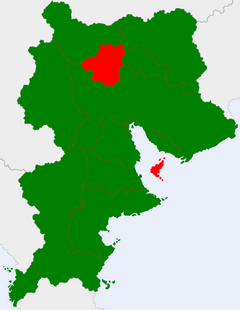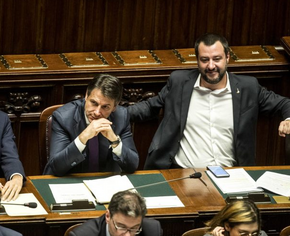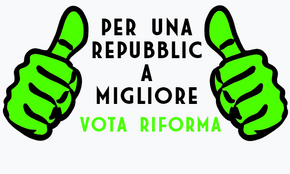2021 Etrurian constitutional referendum: Difference between revisions
| Line 58: | Line 58: | ||
=== Endorsements === | === Endorsements === | ||
=== Reform === | |||
=== Abolition === | |||
=== Boycott === | |||
== Results == | == Results == | ||
==Controversies== | ==Controversies== | ||
Revision as of 18:17, 22 August 2021
| 2021 Etrurian constitutional referendum | ||
|---|---|---|
 States that backed reform in green, abolition in red | ||
| Location | Etruria | |
| Date | 20 August 2021 | |
| Voting system | Majority voting | |
| Results | ||
The 2021 Etrurian constitutional referendumwas a controversial vote on the future of the State Council of the Federation, the upper-chamber of the Senate of the Federation held on 20 August, 2021, in which voters were asked whether they supported the proposed reform package of the Etrurian government or supported its abolition and the establishment of an unicameral legislature, also presented by the Etrurian government. The referendum was authorised under the 2021 Law on Constitutional Reform and resulted in 52.27% of voters supporting reform, under the 2021 Law, the result was legally binding. The referendum was marred in controversy over the distinct benefit both options presented to the far-right government, while it also saw the Social Democratic Party and Citizens' Alliance, the two primary opposition parties boycott the campaign and poll. The result was officially recognised in the 2021 Constitutional Amendment, which implemented the proposed reform package, also controversially including pre-produced electoral reforms that were widely accused of gaming the system to the benefit of the Tribune Movement, with gerrymandered constitutiences, malapportionment of seats and a weakening of the Federal Electoral Commission. Owing to the controversy and the boycotts by Etruria's opposition parties, turnout was only 40.30%, the lowest of any electoral event in Etrurian history.
In wake of the referendum's failure to meet the legally mandated threshold, the Etrurian government announced its intention to present the reform package to the Senate, and pass the reforms through legislative means. The defeat also resulted in the sacking of several Tribune Movement officials from positions within the party leadership.
Background
State Council of the Federation
Since the restoration of democracy in 1984 and the adoption of the Fourth Constitution, the State Council of the Federation has served the role of upper-house within the Senate of the Federation. It has 150 members, with each of Etruria's states electing 10 representatives - though the means differs per state, ranging from a PR party list to winner-takes all first past the post system. The upper-house much like its Euclean counter-parts is tasked with scrutinising legislation presented by the lower-house, amending legislation and holding committee hearings on government actions and policies. Owing to Etruria placing sovereignty with its parliament, the Chamber of Representatives is the superior chamber of the two.
Causes of the referendum
In June 2021, a corruption scandal involving the President of the Council, Ettore Mantovano and a number of State Councillors from the Tribune Movement, Citizens' Alliance and Democratic Alternative for Etruria broke in the news, after officers of the Civil Security Service, the federal law-enforcement agency dedicated to fighting organised crime, corruption and terrorism, conducted raids on offices. It was later revealed that the State Councillors had been receiving bribes, kickbacks, gifts and that President Mantovano had requested and secured a regular cut of bribes in exchange for blocking internal investigations into the corrupt practices.
In response, the Tribune government announced plans to radically reform the upper-house, which it claimed had become a "spring of criminality and corruption" and was no longer fit for purpose. The Tribune government over the course of several weeks utilised a Reform Committee chaired by Interior Minister Gianfranco Galizia to explore "viable options for a dramatic overhaul."
Ballot options
In early July, the government revealed its proposals for reforming the State Council. The first proposal was reforming the State Council and how its membership were appointed, this was mostly drawn along similar lines to the Estmerish Chamber of Peers, in which the states would each appoint ten representatives and 60 members would be appointed by the Federal government - these appointees would be selected on the basis of their contributions to national life, the economy and society. This would raise the total number of members from 150 to 210. A second change would be the abolition of the 2/3 majority in the upper-house to amend the constitution, if the government passed legislation with a 2/3 vote in the lower-house. This led to accusations that the reform proposal was a power-grab by the government to reduce the procedural limits of amending the constitution.
The second option produced by the government was the abolition of the State Council and establishment of an unicameral legislature. The abolition of the upper-house was not to result in equal representation of the states, which would have drawn significant opposition from Novalia, which is governed by the Tribune's allies, the Farmers and Workers Union. In exchange for the lack of equal representation, the unicameral Senate would recieve extra powers of scrutiny and accountability, while new "super committees" would be established.
During the presentation of the options, it was made apparent by statements made by government ministers and Tribune lawmakers, that the abolition option was not well received and many accused the option of posing a threat to the federal system of government. However, Interior Minister Gianfranco Galizia who was tasked with presenting the options confirmed it was government policy that it remain an option in a referendum on the matter.
Referendum Bill and Electoral Reform Amendment
Following the presentation of the options, the government tabled a referendum bill to present both options to the electorate on 20 August 2021. As the presentation session had allowed a free debate on the proposals, the bill itself was only granted a 30-minute debate period. Leader of the opposition, Gianluca Tozza (CA) decried the referendum as a "stitch up of most dark intentions", while Chiara Mastromarino, the leader fo the Social Democrats immediately announced that her party would boycott the referendum as both options on the ballot posed an "extisential threat to the legislative branch." The bill however passed along party lines, with the Tribune Movement and Farmers and Workers Union being the only parties to support the bill, sending it onto the State Council 443-237.
An hour after its passing in the Chamber, the State Council under interim president, Ivana Balic, received the bill and allotted only a 90-minute debate period, which sparked protest due to the lack of a free-debate on the options for the upper-chamber. Controversially, the bill was amended by the government benches to include the 2021 Electoral Reform Bill, a piece of legislation that included dramatic shake ups of the electoral system for federal elections. These included the reduction of seats from 680 to 600, the increase of first past the post seats to 500, and the merger of 100 seats under PR into a singular national constituency, while also giving state-governments significant powers of electoral infrastructure (location of polling stations, determining necessary ID documents and enabling poll watchers.) Among the most controversial elements of the electoral reform was the adoption of the 2019 constituency boundary review, which was widely condemned for its malapportionment and gerrymandering of FPTP constiuencies. The State Council passed the amended bill after the 90-minute debate and rapid reading stages 98-52, again along party lines.
Campaign
Campaign groups
Under the 2021 Referendum Law, the campaign was to take place from 1 August to 19 August and two campaign groups were permitted, one for each option, which had be registered with the Federal Electoral Commission by 29 July. Each campaign was allocated a €20.5 million spending limit, which would be required to be registered with the FEC. Notably, the FEC did not announce any televised debates between campaign leaders and did not apply limitations to televised media output. President Francesco Carcaterra announced the referendum would be a free vote for the Tribune Movement, and that he would not campaign for either option and would instead focus on mobilising the electorate.
Per Una Repubblica a Migliore
The pro-Reform campaign was registered on 27 July as "Per Una Repubblica a Migliore" (For a Better Republic) and appointed Deputy President Vittoria Vasari as its chair and Interior Minister Gianfranco Galizia as its Campaign Director. Within days of its establishment, the campaign reached the funding limit, with near every major donor to the Tribune Movement supporting the campaign. Notably, the campaign received the backing of the entire Federal Cabinet and a majority of federal lawmakers. The Campaign was also boosted with the backing of the entire Farmers and Workers Union and the Social Party of the Third Order.
Abolire = Rinnovare
The pro-abolition campaign was established as "Abolire=Rinnovare" (Abolition=Renewal) and appointed Prefect of Veratia, Giuliano Aurelio Vinci as its chairman and Konstantin Stanic as its campaign director. The campaign struggled to secure donations from traditional Tribune circles owing to the rapid backing of the government-backed reform campaign. Throughout the campaign, the abolition camp raised just €8 million compared to the Reform campaign's €20 million. The abolition campaign was widely derided by the press and society at large, due to its near total absence from the streets, the lack of any television material and no appearances by Vinci or Stanic. The fact that both campaigns were headed by two prominent Tribune politicians invited further derision and criticism, with several commentators describing the abolition campaign as "entirely theatrical."


